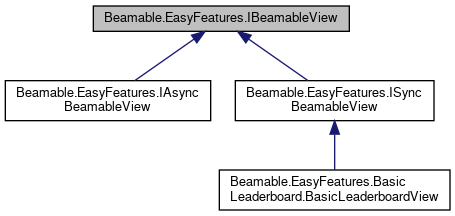This is the common interface that the BeamableViewGroup talks too when it's BeamContext are configured on start or BeamableViewGroup.Enrich (or BeamableViewGroup.EnrichWithPlayerCodes) gets called via code. More...

Public Member Functions | |
| int | GetEnrichOrder () |
| BeamableViewGroup sorts it's managed IBeamableView by this value before calling Enrich. More... | |
Detailed Description
This is the common interface that the BeamableViewGroup talks too when it's BeamContext are configured on start or BeamableViewGroup.Enrich (or BeamableViewGroup.EnrichWithPlayerCodes) gets called via code.
The underlying type should control one View and be a MonoBehaviour. In a game-specific way, this means one Scene/Prefab — any group of Visual game objects and components that together solve the problem of "rendering my specific game's interactivity layer (UX)".
Every IBeamableView will have nested interface types (such as LeaderboardView.IViewDependencies that must implement IBeamableViewDeps) declaring it's dependencies. It expects these dependencies to have been registered with BeamContextSystemAttribute and Beamable.Common.Dependencies.RegisterBeamableDependenciesAttribute. In your user code, you can ignore this part and not declare any IBeamableViewDeps. Instead, you can depend directly on your game-specific types if you wish so, making this process simpler.
To enable customization of the IBeamableViews that ship with Beamable, we declare these interfaces as we believe there's value provided by their existence. Our future marketplace users may wish to do so too.
Member Function Documentation
◆ GetEnrichOrder()
| int Beamable.EasyFeatures.IBeamableView.GetEnrichOrder | ( | ) |
BeamableViewGroup sorts it's managed IBeamableView by this value before calling Enrich.
Implemented in Beamable.EasyFeatures.BasicLeaderboard.BasicLeaderboardView.
The documentation for this interface was generated from the following file:
- com.beamable/Runtime/EasyFeatures/IBeamableView.cs